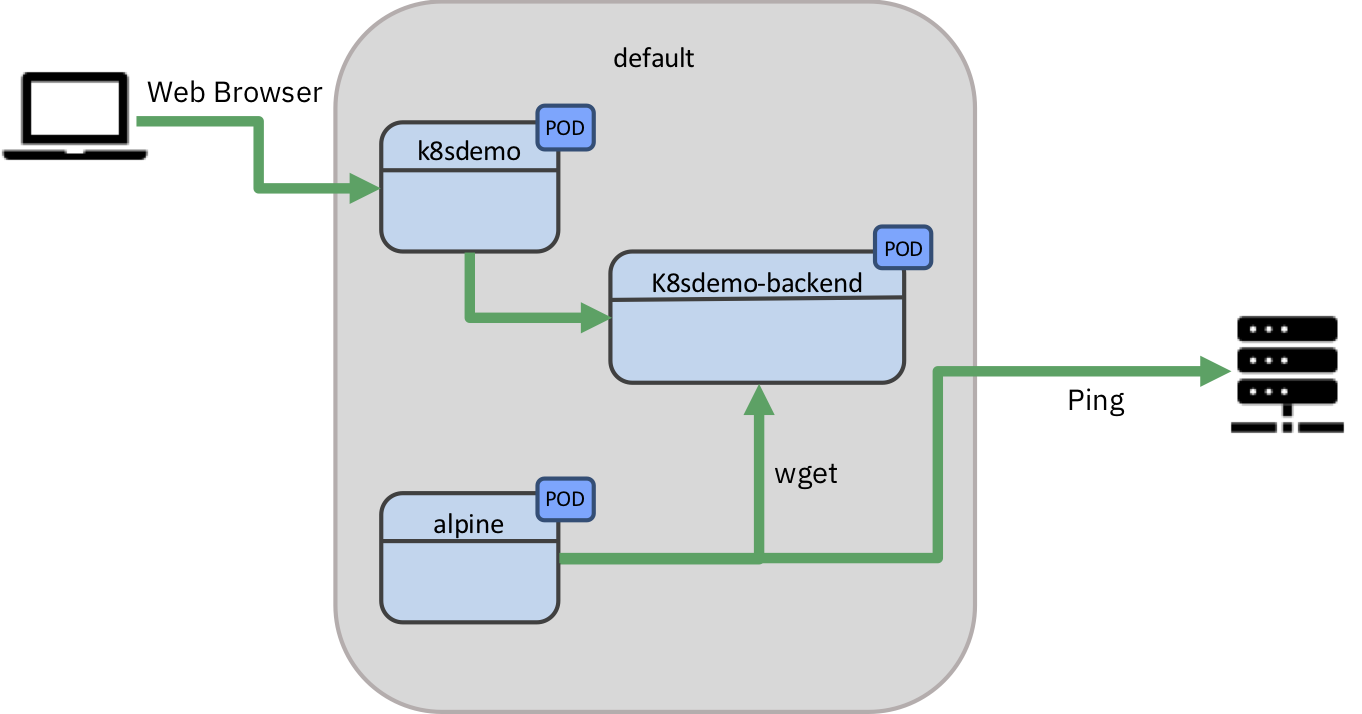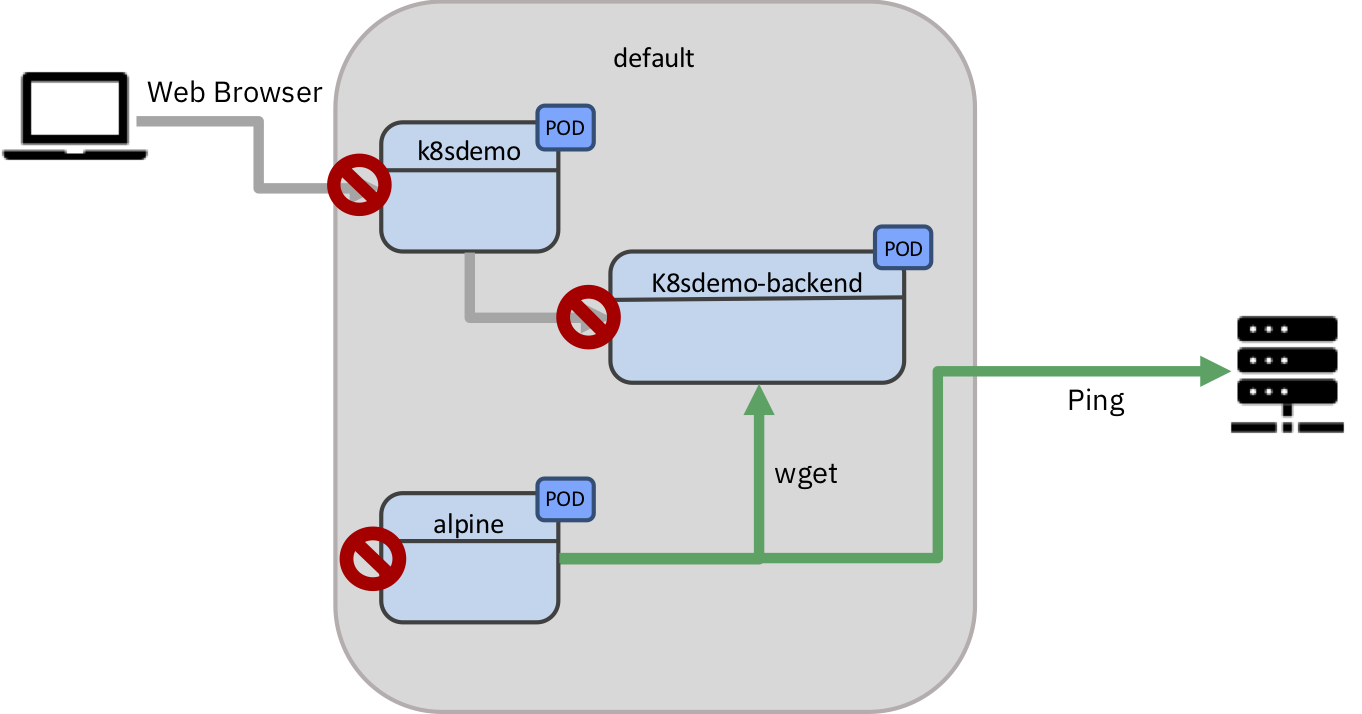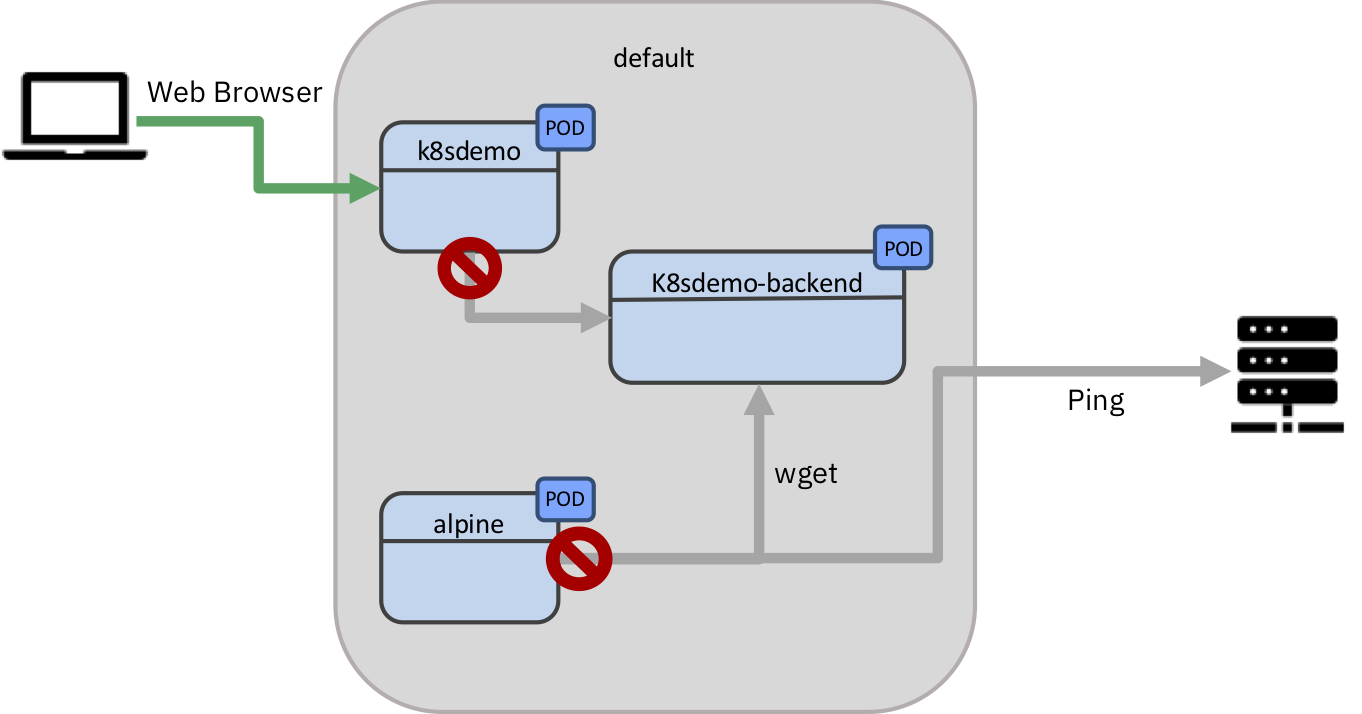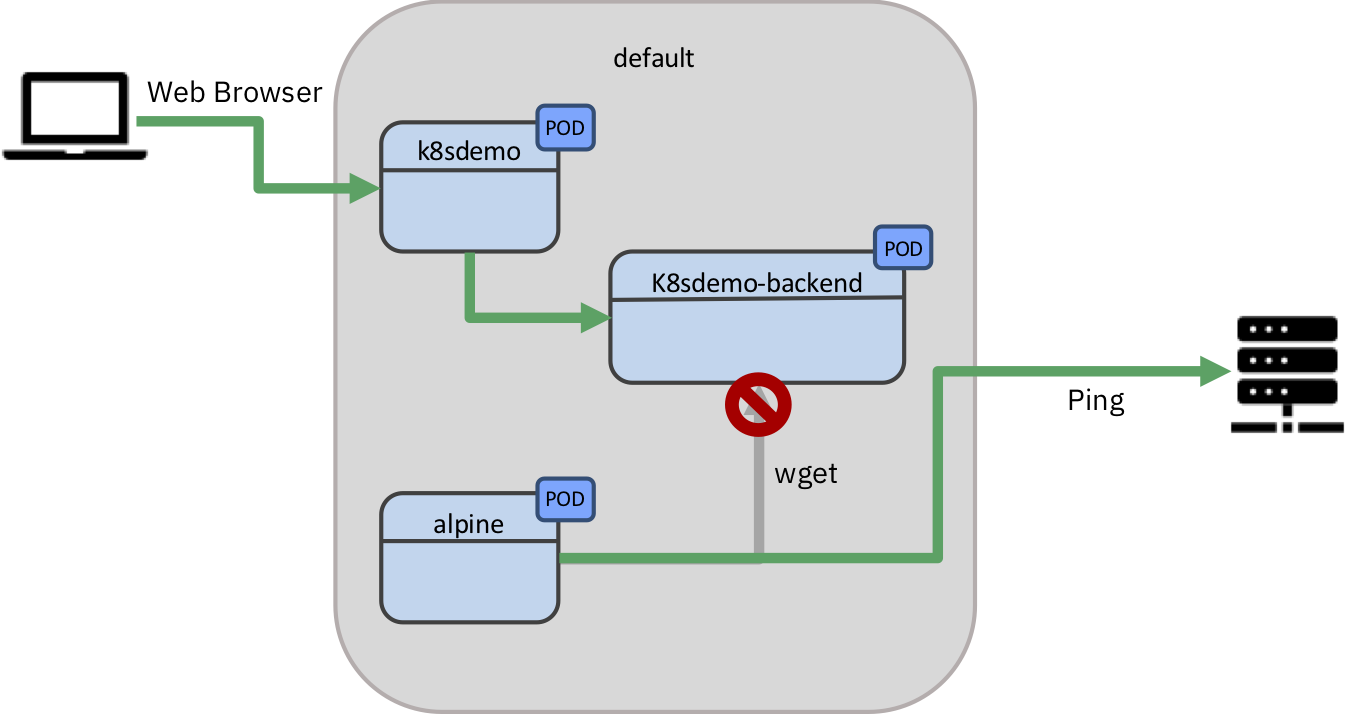Lab 1: Network Policies
Kubernetes network policies specify how pods can communicate with other pods and with external endpoints. By default, no network policies are set up. If you have unique security requirements, you can create your own network policies.
The following network traffic is allowed by default:
- A pod accepts external traffic from any IP address to its NodePort or LoadBalancer service or its Ingress resource.
- A pod accepts internal traffic from any other pod in the same cluster.
- A pod is allowed outbound traffic to any IP address.
Network policies let you create additional restrictions on what traffic is allowed. For example you may want to restrict external inbound or outbound traffic to certain IP addresses.
For this lab we’ll use a network policy to restrict traffic between pods.
Let’s say that we want to limit access to the k8sdemo-backend server to just expose the k8sdemo application.
First we can observe that the k8sdemo-backend server is open to any pod by spinning up a Linux shell.

Network Policies First Steps
First let’s create a Pod that will assist you in testing the reachability of the different elements.
-
Open a new Terminal Window or Tab and run (this can take some time):
kubectl run -it --rm --restart=Never alpine -n default --image=alpine sh > If you don't see a command prompt, try pressing enter. > / #``
-
Now from inside the Pod run the following commands.
-
The
alpine~> promptindicates that the commands must be executed inside the running Pod.alpine~> wget -O- k8sdemo-backend-service.default.svc:3000 > Connecting to k8sdemo-backend-service.default.svc:3000 (10.103.242.14:3000) > K8s Demo Backend 100% |**************************************************************| 197 0:00:00 ETA``
You should get the HTML response from the backend server.
-
And you should be able to ping external adresses (45.55.44.56 is Google)
alpine~> ping 45.55.44.56 > PING 45.55.44.56 (45.55.44.56): 56 data bytes > 64 bytes from 45.55.44.56: seq=0 ttl=59 time=133.476 ms > 64 bytes from 45.55.44.56: seq=1 ttl=59 time=136.036 ms > 64 bytes from 45.55.44.56: seq=2 ttl=59 time=125.471 ms``

Control incoming traffic
Now let’s create the first NetworkPolicy that simply blocks all traffic coming into all pods.
-
Run the following command
kubectl create -f ~/training/networkpolicies/deny-all-ingress.yaml``
This creates the following
NetworkPolicywhich blocks incoming traffic to all Pods.apiVersion: networking.k8s.io/v1 kind: NetworkPolicy metadata: name: default-deny-ingress namespace: default spec: podSelector: {} policyTypes: - Ingress``
-
Now from inside the Pod run:
alpine~> wget -O- k8sdemo-backend-service.default.svc:3000 > Connecting to k8sdemo-backend-service.default.svc:3000 (10.103.242.14:3000) ...``
You should get no response from
k8sdemo-backend. -
But you should still be able to ping external adresses
alpine~> ping 45.55.44.56 > PING 45.55.44.56 (45.55.44.56): 56 data bytes > 64 bytes from 45.55.44.56: seq=0 ttl=59 time=133.476 ms > 64 bytes from 45.55.44.56: seq=1 ttl=59 time=136.036 ms > 64 bytes from 45.55.44.56: seq=2 ttl=59 time=125.471 ms``
-
Reload the web application. It load but the backend remains unreachable
Testing DEMO_API STATUS: ERROR Trying to reach backend ….
We have just blocked all traffic coming into the pods, but not the outgoing.

Clean-up
Delete the NetworkPolicy in order to go back to normal.
kubectl delete NetworkPolicy -n default default-deny-ingress
Control outgoing traffic
Now let’s create a NetworkPolicy that simply blocks all outgoing traffic from all pods.
-
Run the following command
kubectl create -f ~/training/networkpolicies/deny-all-egress.yaml``
This creates the following
NetworkPolicywhich blocks all outgoing traffic from an Pod.apiVersion: networking.k8s.io/v1 kind: NetworkPolicy metadata: name: default-deny-egress namespace: default spec: podSelector: {} policyTypes: - Egress``
-
Now from inside the Pod run:
alpine~> wget -O- k8sdemo-backend-service.default.svc:3000 > Connecting to k8sdemo-backend-service.default.svc:3000 (10.103.242.14:3000) ...`` You should get no response from the
k8sdemo-backendas the web frontendk8sdemooutgoing traffic is blocked. -
And you should not be able to ping external adresses as the
alpinepod outgoing traffic is blocked.alpine~> ping 45.55.44.56 ...``
-
Reload the web application. It should load again, but still with the error from the backend:
Testing DEMO_API STATUS: ERROR Trying to reach backend ….
We have just blocked all traffic going out of the pods, but not the incoming.

Clean-up
Delete the NetworkPolicy in order to go back to normal.
kubectl delete NetworkPolicy -n default default-deny-egress
Control Pod to Pod communication
Now let’s create a NetworkPolicy that simply blocks all incoming traffic for the backend (k8sdemo-backend) except the one coming from the web frontend (k8sdemo).
-
Run the following command
kubectl create -f ~/training/networkpolicies/deny-except-web.yaml``
This creates the following
NetworkPolicy. This policy allows for all traffic, except incoming for the backend Pod.apiVersion: networking.k8s.io/v1 kind: NetworkPolicy metadata: name: k8sdemo-web-backend namespace: default spec: podSelector: matchLabels: app: k8sdemo-backend policyTypes: - Ingress ingress: - from: - podSelector: matchLabels: app: k8sdemo``
-
Now from inside the Pod run:
# wget -O- k8sdemo-backend-service.default.svc:3000 > Connecting to k8sdemo-backend-service.default.svc:3000 (10.103.242.14:3000) ...``
You should get no response from
k8sdemo-backendas onlyk8sdemois allowed to access it. -
You should be able to ping external adresses as outgoing traffic is not blocked.
# ping 45.55.44.56 > PING 45.55.44.56 (45.55.44.56): 56 data bytes > 64 bytes from 45.55.44.56: seq=0 ttl=59 time=143.152 ms > 64 bytes from 45.55.44.56: seq=1 ttl=59 time=120.875 ms > 64 bytes from 45.55.44.56: seq=2 ttl=59 time=130.981 ms``
-
Reload the web application. It should load, without error from the backend:
Testing DEMO_API STATUS: OK Message from the Backend The IP Address is <IP_ADDRESS>
We have just blocked all traffic going to k8sdemo-backend, except the one coming from k8sdemo thus isolating and securing the communication.

In this Lab we have seen how NetworkPolicies enable us to isolate and control access to and from Pods in the Cluster.
Clean-up
Delete the NetworkPolicy in order to go back to normal.
kubectl delete NetworkPolicy -n default k8sdemo-web-backend
Congratulations!!!
This concludes Lab 1 on Network Policies